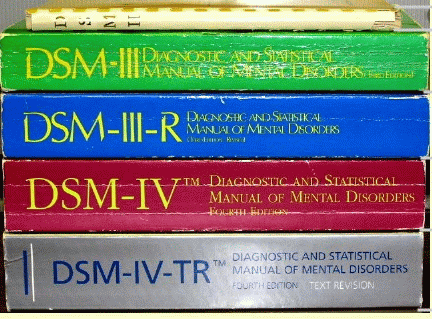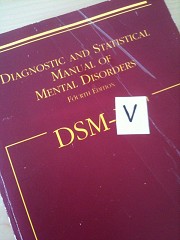The DSM and Addiction: Why Addiction Terminology Matters
Since this is a blog on “Addiction” I thought it would be important to discuss the diagnostic criteria and terminology the Diagnostic and Statistical Manual of Mental Disorders (DSM-IV) uses, because the current manual does not include the word “addiction.” The current manual uses substance abuse and substance dependence. For the definitions and criteria on what substance abuse and dependence is see here.
DSM-IV:  Substance Abuse vs. Addiction
Substance Abuse vs. Addiction
The current DSM-IV section for abuse and dependence is called “Substance-Related Disorders” and does not use the word “addiction. The new DSM-V (which is currently in the works) now has a new tentative title “Addiction and Related Disorders.” For a long time there have been debates on what is addiction, and in a lot of writings people use the term substance dependence as interchangeable with addiction. A lot of people say there are very different definitions of substance dependence and that of addiction.
My story also includes eating disorders, self harm, and anxiety disorders. I know when I was seeking treatment they used the “substance dependence” box versus the eating disorder box, to help get me approved for treatment. The DSM is important to understand when we are talking about addiction, because it impacts how people are labeled, helps us understand stigmas placed on people, and impacts treatment and level of care.
This is why people are trying so hard to work on changing terminology used because it is really important in the studies and clinical care of people who are struggling from these issues.
 The DSM-V will re-introduce the word “Addiction”
The DSM-V will re-introduce the word “Addiction”
I think it will be interesting to see how the DSM-V is changed, because in its proposal they are looking to limit the word dependence to physiological dependence rather than a label for addiction. The argument is that physiological dependence is a normal response of the central nervous system to that of a substance versus a compulsive substance seeking behavior that is common in addiction.
Another of the issues is the concepts of tolerance and withdrawal, because those who have pain management issues, may experience tolerance and withdrawal, but not be compulsive in behavior, and this presence of tolerance and withdrawal adds to the stigma of those who require medication for pain management.
The word “addiction” helps better encompass the chronic, compulsive and relapsing nature of continued substance abuse, despite negative consequences experienced over and over.
You might be asking – why are you writing a post on terminology so readily used surrounding addiction?
I wanted to delve into the topic of terminology because it is important to understand the diagnostic criteria of what makes something abuse or dependence in the current DSM manual. The DSM is the common language for current study and practice, and while it is evolving into a new manual, these terms will pave the way for future research and clinical practice. It provides a standardized approach to diagnosis and psychology.
The terms also matter because when a person is seeking treatment for a struggle, with abuse, dependence or addiction, there will be a criteria used to determine the best possible treatment care (including evidenced based care that has been shown in research as an effective treatment methodology), but also plays into health insurance coverage for care.
When we talk about issues we need to know what the terms are, and how they affect diagnosis, treatment, and societal impressions of disorders. Addictive behavior and its study cross so many lines and disciplines, including but not limited to pharmacology, sociology, neuroscience, genetics and biology. The terminology needs to be consistent and clear, especially since we are seeing more and more emphasis on multidisciplinary research and treatment approaches.
The constant refining of these terms helps researchers (as well as clinicians) better understand the use, abuse, dependence and addiction of behaviors and substances in order to help develop better methods in diagnosing and treating co-mordid conditions.
Co-Morbidities and Addictions
When I was looking for treatment, I had eating disorders, alcohol abuse/dependence, self harm, panic disorder and GAD. Trying to find a place where they would take me was a challenge for my parents. At the time, there were specialized treatment places, but they wouldn't be able to treat all of my struggles. We need to discuss co-morbidities more and understand that the terminology matters. A multidisciplinary approach will provide a better (and more inclusive) treatment option for many struggling more than one diagnosis, like me.
Find me on Facebook (http://www.facebook.com/AVoiceinRecovery) or Twitter (http://twitter.com/voiceinrecovery)
APA Reference
Sebelius, K.
(2011, June 2). The DSM and Addiction: Why Addiction Terminology Matters, HealthyPlace. Retrieved
on 2026, March 5 from https://www.healthyplace.com/blogs/debunkingaddiction/2011/06/the-dsm-and-addiction-why-terminology-matters
Author: Kendra Sebelius
After I originally left a comment I appear to have clicked
the -Notify me when new comments are added- checkbox and from
now on each time a comment is added I recieve 4 emails
with the exact same comment. There has to be an easy method you are able to remove me from that service?
Kudos!
Good day I am so delighted I found your blog, I
really found you by error, while I was looking on Google for something else, Nonetheless
I am here now and would just like to say thanks for a fantastic post and a all round thrilling
blog (I also love the theme/design), I don't have time to go through
it all at the minute but I have saved it and also added your RSS feeds,
so when I have time I will be back to read more, Please do
keep up the awesome job.
[...] I argue that even if ill-fitting mental illness diagnoses do matter. (Also read a good piece about addiction terminology. Did you know “addiction” isn’t in the [...]
[...] It’s not that addiction as a concept isn’t used in psychology or psychiatry; it’s just that it’s not a diagnosis. It’s more a common turn-of-phrase than anything else. (As fellow HealthyPlace blogger Kendra Sebelius points out, the next version of the DSM may include a definition for addiction.) [...]
Hello Kendra,
I've just started reading your blog (I'm an avid reader of some of the other blogs on here, but I just spotted yours recently) and I think it's great! I'm actually in school training to become an addictions counsellor at the moment.
Co-morbidity is VERY common with addiction, speaking from experience as well as my classroom-based lessons. At least in the course I'm in, we do focus on mental illness in combination with addiction(s). That being said, my course is very specialized, and a lot of people in the addictions field have a less specific background (at least where I come from) of social work or psychology.
From what I've learned, multidiciplinary approaches ARE best. The disease model, the psychosocial model, etc etc... they're all fine, but they work bes together.
Thank you so much Ash for that great comment and introduction to yourself!!! I am so glad you found the blog and enjoy this one so far! Co-morbidity is my area I love since I have a history in addiction and eating disorders, so it is a passion. I also am a research dork, and think it is crucial to understand terminology, trends in research, treatment, etc. I love the multidisciplinary concept because it integrates knowledge from a diverse field of research to best serve the people who are struggling.
Thank you again for your wonderful comment and welcome!